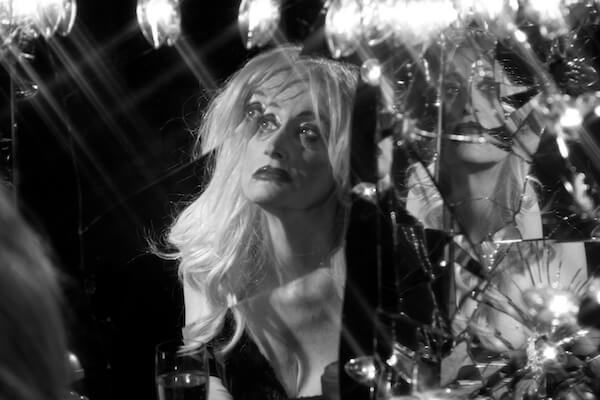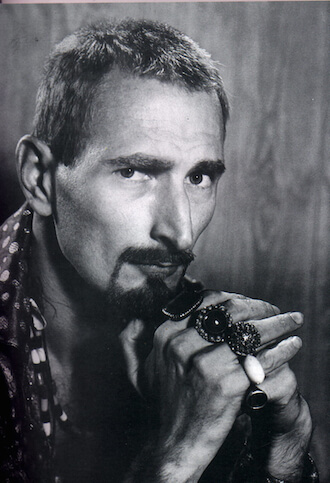Katharine Hepburn in George Cukor’s 1935 comedy “Sylvia Scarlett.” | COURTESY: ANTHOLOGY FILM ARCHIVES
A celebration of cross-dressing in cinema unspools at Anthology Film Archives March 23-31. The films, an international mix of features and documentaries, show how men in women’s clothing and women in men’s clothing are often played for laughs.
John Epperson (aka Lypsinka), who guest curated the program, will be on hand March 23 to present “Wigstock: The Movie,” both the 1995 documentary and the 1987 short of the same name.
This joyful chronicle of the once-annual New York City drag festival is a fabulous film, featuring enjoyable performances by Lypsinka, RuPaul (long before his “Drag Race”), Jackie Beat, Mistress Formika, Joey Arias, Candis Cayne, the Lady Bunny, Tabboo, Deee-Lite, and many others. Some of the most poignant scenes showcase the late Alexis Arquette, who is amusing in and out of drag.
Anthology Film Archives looks at gender illusion over the years
“Wigstock: The Movie” is inspiring because it shows the strength men get dressing in female clothing. Drag is liberating and empowering; a message repeated throughout the film is: put on a wig, a dress, and heels and then strut. Or, as one interviewee exclaims, “You feel so much more fabulous when you’re in drag.”
Gay director George Cukor’s 1935 comedy “Sylvia Scarlett” (Mar. 24 & 30, 7 p.m.) features Katharine Hepburn in a cross-dressing performance as the title character, a young woman who masquerades as a boy, Sylvester. “He” works with his father (Edmund Gwenn) and a stranger, Jimmy Monkley (Cary Grant), to swindle others. They have mixed success, but then “she” falls for a painter, Michael Fane (Brian Aherne) and reveals her ruse.
Cukor’s film is a mixed bag. He coaxes fine performances from the leads and displays flair in some of the film’s madcap comedic moments, but overall, “Sylvia Scarlett” doesn’t quite work. Its portrayal of gender roles was ahead of its time but the film never quite engages the emotions.
A trio of films — the 1933 German film “Viktor und Viktoria” (Mar. 25, 4:30 p.m.; Mar. 29, 6:30 p.m.), the 1935 British remake “First a Girl” (Mar. 25, 7 p.m.; Mar. 27, 9 p.m.), and the 1982 Blake Edwards update, “Victor/ Victoria” (Mar. 25, 9 p.m.; Mar. 29, 8:45 p.m.; Mar. 31, 6:30 p.m.) — are variations on the same gender-bending plot in which a woman impersonates a man impersonating a woman.
Jessie Matthews in “First a Girl,” a 1935 remake of the German film “Viktor und Viktoria,” made two years before. | COURTESY: ANTHOLOGY FILM ARCHIVES
“First a Girl” is a witty version of this story in which Elizabeth (Jessie Matthews), a wannabe showgirl meets Victor (Sonnie Hale), a music hall performer. When he can’t go on one night, she arrives as “Bill” a man, who will impersonate a female. The show is a slapstick success, and the pair go on tour. The film features several eye-popping musical numbers.
“Bill” and Victor eventually catch the eye of Princess Miranoff (Anna Lee) and her fiancé, Robert (Griffith Jones). A scene of “Bill” smoking cigars and drinking Robert under the table is a comic highlight. In contrast, a scene of Victor trying to get “Bill” into bed strains for humor.
“First a Girl” is notable not just for the cross-dressing, but for how gender roles and social and sexual conventions played out in the 1930s. This film is particularly significant for how the characters lie and deceive one another for their own ends. It’s a fun film.
“Outrageous!” (Mar. 26, 8:30 p.m.; Mar. 31, 9:30 p.m.) made 40 years ago, may be a bit dated, but it’s still a terrific showcase for Craig Russell and his female impersonations. Robin (Russell) is a gay hairdresser in Toronto who takes in Liza (Hollis McLaren), a schizophrenic who has left her mental institution after eight years. They provide comfort for each other, and the pair’s heartfelt chats form the emotional core of the film.
The film’s second half, which involves some lucky breaks and plot contrivances, has Robin moving to New York to perform in drag. There are extended scenes of his impressive Carol Channing, Mae West, and Judy Garland impersonations — so many, in fact, that it feels like the film’s story was built around Russell’s act.
What is refreshing about “Outrageous!” is how the gay and female characters are almost all supportive of one another, and it is the straight, mainstream society that has to adjust. The film may wear its message that being “special” is better than being “normal” on the sleeves of its gowns, but it is still worthy.
Rounding out the program, is John Waters’ 1974 classic “Female Trouble” (Mar. 24, 9:15 p.m.; Mar. 27, 7 p.m.; Mar. 30, 9:15 p.m.) starring Divine as Dawn Davenport, a young woman who acts out after her parents fail to buy her the cha-cha heels she wants for Christmas. Leaving home, she meets Earl (also played by Divine, only out of drag) who has sex with and impregnates her. Dawn soon enters into a criminal life, gives birth to a bratty daughter (Mink Stole), and get married to Gater (Michael Potter), but later divorced.
The film’s charm is how Waters and Divine amusingly subvert social norms, as when Ida (Edith Massey) begs her nephew Gator to be gay because heterosexuals are so boring. Divine goes all out in her role, from biting her baby’s umbilical cord to a fabulous trampoline act that ends with Dawn shooting members of the audience for art. Her trial is also one of the film’s highlights.
Dawn may have her issues, but Waters’ film is really about its cross-dressing heroine taking control of her life — while taking no prisoners.
CROSS-DRESSING ON SCREEN | Mar. 23-31 | Anthology Film Archives | 32 Second Ave. at Second St. | anthologyfilmarchives.org




































